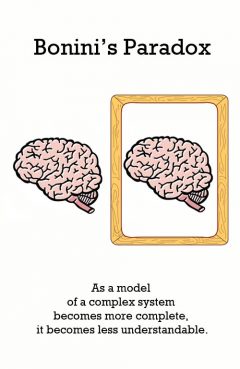Bonini's Paradox

Release Date: //1963
Country of Release:
Length:
MPAA:
Medium: Paradox
Genre:
Release Message: As a model of a complex system becomes more complete, it becomes less understandable. Authored by Charles Bonini.
Description: Bonini's Paradox named after Stanford business professor Charles Bonini, explains the difficulty in constructing models or simulations that fully capture the workings of complex systems (such as the human brain).[1] In modern discourse, the paradox was articulated by John M. Dutton and William H. Starbuck[2] "As a model of a complex system becomes more complete, it becomes less understandable. Alternatively, as a model grows more realistic, it also becomes just as difficult to understand as the real-world processes it represents" (Computer Simulation of Human Behaviour, 1971). This paradox may be used by researchers to explain why complete models of the human brain and thinking processes have not been created and will undoubtedly remain difficult for years to come. This same paradox was observed earlier from a quote by Paul Val ry, "Everything simple is false. Everything which is complex is unusable." (Notre destin et les lettres, 1937) Also, the same topic has been discussed by Richard Levins in his classic essay "The Strategy of Model Building in Population Biology", in stating that complex models have 'too many parameters to measure, leading to analytically insoluble equations that would exceed the capacity of our computers, but the results would have no meaning for us even if they could be solved. (See Orzack and Sober, 1993; Odenbaugh, 2006). The problem that emerges when the model of a phenomenon is just as hard to explain as the phenomenon it is supposed to explain. The less information a model carries about its subject, the less useful it's going to be in helping someone understand that subject. And yet, the more information a model carries about its subject, the less useful it's going to be in helping someone understand any single point of that subject.